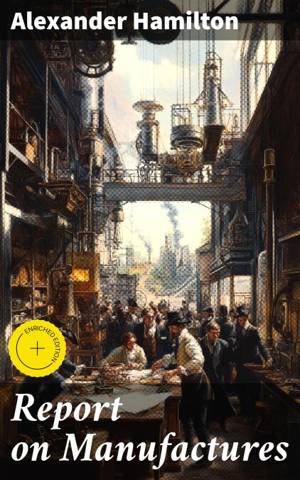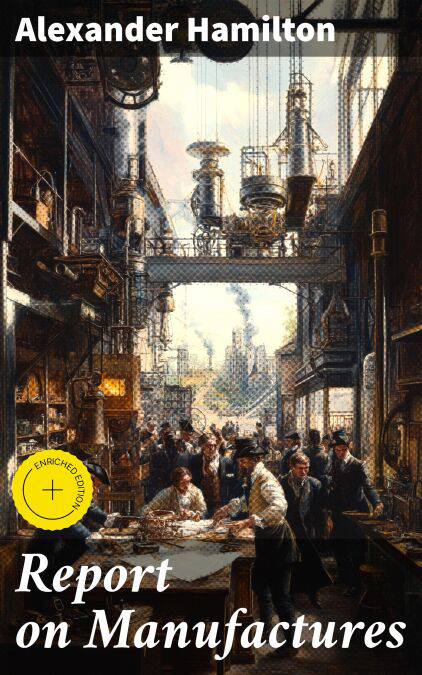
Bedankt voor het vertrouwen het afgelopen jaar! Om jou te bedanken bieden we GRATIS verzending (in België) aan op alles gedurende de hele maand januari.
- Afhalen na 1 uur in een winkel met voorraad
- In januari gratis thuislevering in België
- Ruim aanbod met 7 miljoen producten
Bedankt voor het vertrouwen het afgelopen jaar! Om jou te bedanken bieden we GRATIS verzending (in België) aan op alles gedurende de hele maand januari.
- Afhalen na 1 uur in een winkel met voorraad
- In januari gratis thuislevering in België
- Ruim aanbod met 7 miljoen producten
Zoeken
Report on Manufactures E-BOOK
Enriched edition. Shaping America's Industrial Future: Hamilton's Vision for Economic Growth and Manufacturing Advancement
Alexander Hamilton
E-book | Engels
€ 1,99
+ 1 punten
Uitvoering
Omschrijving
In his seminal work, "Report on Manufactures," Alexander Hamilton articulates a visionary blueprint for the economic development of the fledgling United States. Written in 1791, this foundational text advocates for a robust manufacturing sector, positing that industrial growth is pivotal for national prosperity and security. Hamilton's prose is meticulous and pragmatic, reflecting the Enlightenment values of rationality and progress. He adeptly intertwines economic theory with policy recommendations, emphasizing the role of government in fostering a conducive environment for manufacturing through tariffs, subsidies, and infrastructure investments. Alexander Hamilton, one of the Founding Fathers and the first Secretary of the Treasury, was deeply influenced by his experiences in a mercantile society and his exposure to European economic models. His robust understanding of finance and economics, alongside his commitment to creating a unified national economy, informed his reasoning in this report. Hamilton's innovative thoughts arose during a period of economic uncertainty, thus underscoring his foresight in recognizing the importance of industrialization for the American economy. "Report on Manufactures" is essential reading for anyone interested in economic policy, American history, or the foundational thoughts that shaped the nation's economic trajectory. Hamilton's compelling arguments remain relevant today, making this work not only a historical document but a timeless contribution to discussions on economic development.
In this enriched edition, we have carefully created added value for your reading experience:
- A succinct Introduction situates the work's timeless appeal and themes.
- The Synopsis outlines the central plot, highlighting key developments without spoiling critical twists.
- A detailed Historical Context immerses you in the era's events and influences that shaped the writing.
- An Author Biography reveals milestones in the author's life, illuminating the personal insights behind the text.
- A thorough Analysis dissects symbols, motifs, and character arcs to unearth underlying meanings.
- Reflection questions prompt you to engage personally with the work's messages, connecting them to modern life.
- Hand‐picked Memorable Quotes shine a spotlight on moments of literary brilliance.
- Interactive footnotes clarify unusual references, historical allusions, and archaic phrases for an effortless, more informed read.
In this enriched edition, we have carefully created added value for your reading experience:
- A succinct Introduction situates the work's timeless appeal and themes.
- The Synopsis outlines the central plot, highlighting key developments without spoiling critical twists.
- A detailed Historical Context immerses you in the era's events and influences that shaped the writing.
- An Author Biography reveals milestones in the author's life, illuminating the personal insights behind the text.
- A thorough Analysis dissects symbols, motifs, and character arcs to unearth underlying meanings.
- Reflection questions prompt you to engage personally with the work's messages, connecting them to modern life.
- Hand‐picked Memorable Quotes shine a spotlight on moments of literary brilliance.
- Interactive footnotes clarify unusual references, historical allusions, and archaic phrases for an effortless, more informed read.
Specificaties
Betrokkenen
- Auteur(s):
- Uitgeverij:
Inhoud
- Aantal bladzijden:
- 86
- Taal:
- Engels
Eigenschappen
- Productcode (EAN):
- 4064066063658
- Verschijningsdatum:
- 7/12/2020
- Uitvoering:
- E-book
- Beveiligd met:
- Digital watermarking
- Formaat:
- ePub

Alleen bij Standaard Boekhandel
+ 1 punten op je klantenkaart van Standaard Boekhandel
Beoordelingen
We publiceren alleen reviews die voldoen aan de voorwaarden voor reviews. Bekijk onze voorwaarden voor reviews.









